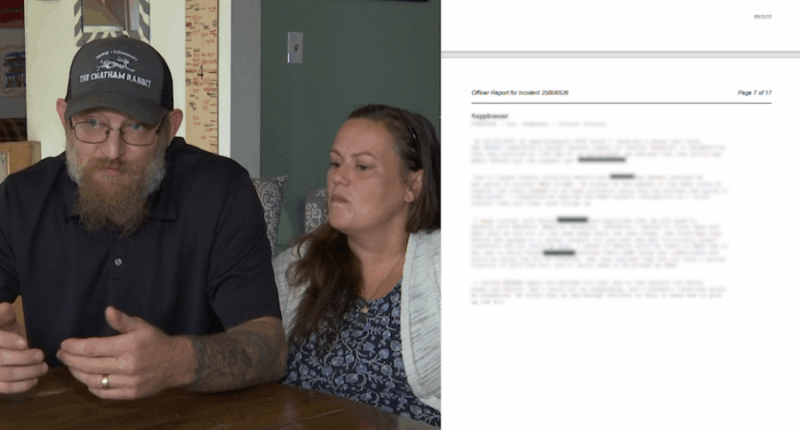Share this @internewscast.com

In BEAUFORT, S.C., a 12-year-old girl disappeared in February, and from the onset, her parents claimed the local police mishandled her case by identifying her as a runaway.
Emily Hollis was later found four days afterward, in a different state, alongside a 16-year-old boy. Even months following the incident, her parents are pursuing additional information to demonstrate police negligence.
The couple reported they eventually received the desired information through records they had requested, but they also received unrelated details they did not anticipate.
“I don’t know what to say other than like ‘God is good’ because this could of went to anybody and it went to us,” said Autumn Hollis, Emily’s mother.
Autumn and her spouse, William, have been persistently requesting documents from the Beaufort Police Department (BPD) under the Freedom of Information Act (FOIA) since Emily’s disappearance.
The Hollis family indicated that Emily had connected with 16-year-old Chase Eskeets on Snapchat, who persuaded her to leave and travel with him to Jacksonville, Florida.
When they realized she wasn’t home on the morning of Feb. 16 and couldn’t get in contact with their daughter, they reported Emily missing.
They said the Beaufort Police though, labeled Emily as a runaway, as she willingly ran away with Eskeets.
The parents said that Emily and Eskeets met on Snapchat just days before they disappeared together, and Eskeets coerced Emily into going with him.
They also said they had never met Eskeets.
The parents urged the Beaufort Police to conduct a more thorough investigation, but they were informed that the matter was beyond the local authority’s reach and was within the jurisdiction of the Jacksonville Police.
Hollis and Eskeets disappeared on Feb. 15 from Beaufort, and were located in the Jacksonville area on Feb. 19.
It’s been months since Emily has returned home, but the parents said it was the most painfully stressful time of their life. Not just because their daughter was missing, but because they felt the police department wasn’t doing enough to help find their daughter.
They sent a new FOIA request back in May requesting information from February to April surrounding Emily’s case.
“We felt like they were negligent, but that wasn’t enough for an attorney. So, I needed to show actual, like documentation to show misconduct, negligence bias from the city from their press release,” said Autumn. “So that was my real intention of doing the FOIA.”
The Hollis’s received the request back on July 29, and said when they finally started to browse the files, they were shocked.
9,000 unredacted files were sent to the Hollis’s, including several files with attachments linked.
The family said that it equaled up to probably almost 20,000 records of unredacted private information.
A part of the released information included their daughters’ full forensic interview, another uncut interview with a 12-year-old girl and thousands more files unrelated to their daughter’s case.
“We received lots of warrants and warrant requests with all information unredacted. We have other cases that we have that are unredacted. We have the city’s budget. We have invoices of them buying things. We have someone’s w-2. My daughter’s medical records were in there. There’s attorney client privilege between the city and the city council. We have D.S.S records,” said William. “You can almost name it. We pretty much have it.”
The City of Beaufort put out a press release in response to the error.
That statement said, “In responding to a recent Freedom of Information Act (FOIA) request from an individual, the City of Beaufort inadvertently disclosed information that was exempt from disclosure and should not have been produced. Upon becoming aware of the issue, City staff immediately removed access to the affected files. The City is currently assessing the scope of the disclosure, ensuring that there is no further dissemination of the information, and notifying any impacted individuals.
“The City is committed to operating with transparency while fully complying with FOIA requirements, including the safeguarding of information that is exempt from public release,” said City Manager Scott Marshall. “We take this matter seriously and are closely reviewing our internal procedures to prevent similar occurrences in the future. The launch of our new NextRequest system marks an important step forward in strengthening these safeguards.”
The parents took a phone call from Assistant City Manager, JJ Suave, where they said the city explained the released unredacted files as a computer software error.
That phone call was recorded and made public on the Hollis’s social media.
“What they told us is that they put the documents in a zip file and it un-redacted everything once it went to the zip files and they sent it to us,” said William.
asked the city how the error happened, and if the FOIA system was faulty.
Suave responded and said, “The records request in question involved more than 9,000 emails and other documents, making it one of the largest single requests the city has ever processed.”
Suae said, “We are continuing to investigate all aspects of how the unintended release occurred. Preliminary findings indicate that the redaction software froze during the process of applying and “cleaning” the files. While the redactions appeared to be properly applied on the local device and during review, they did not remain fully applied once the files were uploaded for distribution and then downloaded. In the released documents, most of the information intended for redaction is clearly outlined in red with a notation stating that it was redacted by the Public Information Officer, demonstrating the clear intent to remove such information prior to release.”
The Hollis’s also said in their phone call with Suave, they were offered to have those unredacted files replaced with just the redacted information they requested. They politely declined since they had the information they needed.
In the phone call, the parents also said Suave asked that the Hollis’s not release any of the information out to the public. The Hollis’s took to social media again, where they said they would not be releasing any sensitive or private files.
They said they have posted redacted files to their social media related specifically to their daughter’s case, looking to show the public how their daughter’s case was handled.
The city also included in their press release that they have adopted a new FOIA system.
“Following a comprehensive evaluation and implementation process that began in February 2025, the City launched its new FOIA management platform this past week. The system enhances data security, incorporates built-in safeguards, and significantly reduces response times, staff workload, and the likelihood of future disclosure errors. FOIA requests can now be submitted online via the City’s NextRequest portal at
Suave said the introduction of the new FOIA system is unrelated to the recent issue.
“The new system, initiated in early 2025 and recently implemented prior to the release of records to the Hollis’, was designed to make the FOIA process more efficient and transparent,” Said Suave. “The Hollis request, made in May, 2025, was processed under the previous process, which was highly manual, requiring staff to gather documents, review and redact them, upload them to cloud storage or attach them to emails, and record requests in a handwritten log.”
Suave said, “The new NextRequest system consolidates all of these steps into a single platform for tracking, review, release, and auditing. It allows the City to monitor all internal access to requests, and it requires redundant approvals before any release is authorized—adding safeguards the previous process did not provide.”
When asked if there had been previous un-redacted releases in the past, Suave responded, “To our knowledge, this is the first time such an issue has occurred. However, since the incident, our research has revealed that others have reported similar redaction problems when using Adobe software.”
Suave said the city is conducting a full assessment of the incident, and any violations of policy will be addressed. They are also investigating the matter, including working with IT contractors, departmental representatives and the city attorney.











